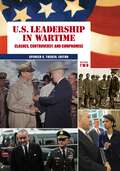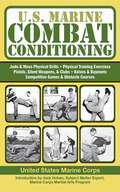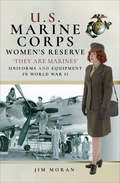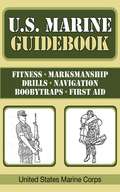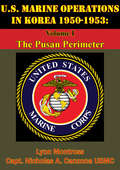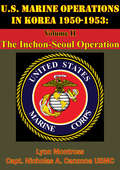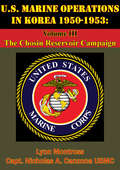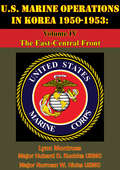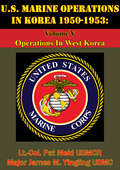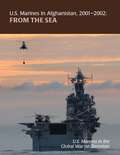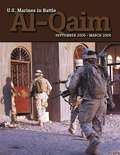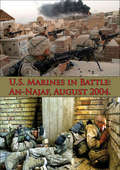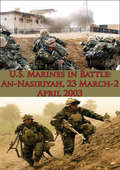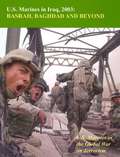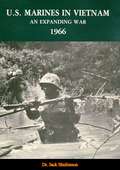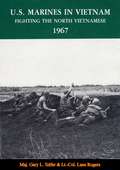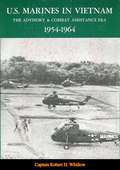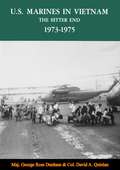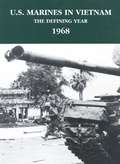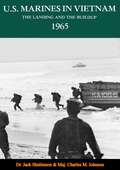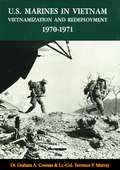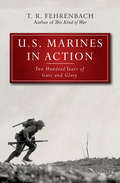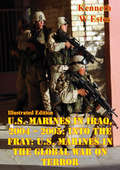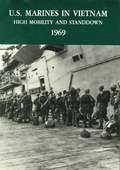- Table View
- List View
U.S. Leadership in Wartime: Volume 1
by Spencer TuckerNow from one of the world's leading publishers of military history comes a breakthrough book on one of the most important and complex aspects of U.S. national defense. U.S. Leadership in Wartime: Clashes, Controversy, and Compromise offers a comprehensive analysis of the characteristics that constitute effective leadership in war and discusses the often contentious relationships between U.S. civilian and military leadership throughout American history.
U.S. Marine Combat Conditioning (US Army Survival)
by United States Marine Corps.U.S. Marine Combat Conditioning is a complete reproduction of the combat conditioning program that was completed by all World War II-era Officer Candidates while at OCS in Quantico, Virginia. Combat Conditioning is defined as the physical and mental conditioning of individual Marines for hand-to-hand combat and is an essential part of the progressive training of all Marines. In addition to conditioning the Marines physically, the program is designed to help them overcome inhibitions toward physical contact. The goal is not only to gain physical strength, agility, and endurance but also to develop confidence as a hand-to-hand fighter both with and without weapons. Additionally, this manual serves as the guide for individual Marine units when establishing their own combat conditioning programs. An invaluable part of U.S. military history, the lessons remain relevant even to-day. With over 200 photographs, U.S. Marine Combat Conditioning demonstrates-in vivid detail-the exercises and training techniques used by marines to prepare for combat as well as their proper application. The program incorporates mass physical drills, competitive games and exercises, and specially designed obstacle and assault courses. In addition to the rigorous physical training, it includes combat instruction in judo as well as the use of knives, bayonets, clubs, silent weapons, and pistols.
U.S. Marine Corps Women's Reserve: They Are Marines': The USMCWR in the Second World War
by Jim MoranThe little known story of these female reservists and the role they played in WWII, packed with photos. When US Marine Commandant Maj. Gen. Thomas Holcomb announced the formation of what became the US Marine Corps’ Women’s Reserve, legend has it, the portrait of one of his predecessors fell off the wall and crashed to the floor—in disbelief. The women were called “Lady Leathernecks,” among other nicknames—some less than flattering. This branch of the US Marines had been authorized by the US Congress and signed into law by President Franklin D. Roosevelt on July 30, 1942. The law allowed for the acceptance of women into the reserve as commissioned officers and at the enlisted level—effective for the duration of the war plus six months. The purpose of the law was to release officers and men for combat and to replace them with women in shore stations. The result was that between 1943 and 1945 the women of America enlisted in the thousands to “Free a Marine to Fight.” This book, the first of its kind, explores in detail the role of female Marines, or WRs as they were known at the time. It also presents a detailed study of the uniforms of the WRs supported by numerous photographs. This book has been written with the full support of the US Marine Corps Histories Division, the Women Marine Association, and surviving WR veterans.
U.S. Marine Guidebook (US Army Survival)
by United States Marine Corps.Here is everything there is to know about the essentials of life as a Marine. From fitness to first aid to firing positions, this book covers all subjects in which every troop, regardless of rank, must maintain proficiency. Learn the Military's Code of Conduct, understand the Dos and Don'ts of surviving as a POW, and grasp the foundation of military law. Find out about Marine customs, uniforms, and drills. Follow the Marine Corps fitness routines to get into the best shape of your life. Read the detailed section on first aid and learn how to perform CPR, make braces for broken limbs, dress and bandage wounds, improvise slings, and transport injured victims. Find out about the symptoms and treatment of chemical agents and learn how to safely travel through a contaminated area. Also included in the U.S. Marine Guidebook are marksmanship requirements; navigation tactics; and nuclear, biological, and chemical defense. The U.S. Marine Guidebook details procedure during combat, including code of conduct in war and when to use deadly force. Because these subjects are first taught and tested during recruit training, they are the distinctive qualities of a Marine and his training. Anyone who is interested in what makes a Marine the strong, brave, and skilled individual he or she must be will find this book fascinating.
U.S. Marine Operations In Korea 1950-1953: Volume I - The Pusan Perimeter [Illustrated Edition] (U.S. Marine Operations In Korea 1950-1953 #1)
by Lynn Montross Captain Nicholas A. Canzona USMCIncludes over 50 photos and 23 maps.THIS IS THE first volume of a planned series dealing with United States Marine Operations in Korea during the period 2 August 1950 to 27 July 1953. Volume I is designed to give the military student and the casual reader an accurate and detailed account of the operations in which Marines of the 1st Provisional Brigade and Marine Air Group 33 participated during the fighting in the Pusan Perimeter, from the date of their landing on 2 August until their withdrawal on 13 September 1950, in preparation for the Inchon landing."AN ABILITY TO furnish skilled forces to meet emergency situations on short notice has long been a hallmark of the Marine Corps. When the call came for such a force to be dispatched to Korea on 2 July 1950, the Corps was handicapped by the strictures of a peacetime economy. Nevertheless, a composite brigade consisting of a regiment and an air group was made available within a week's time.With a reputation built largely on amphibious warfare, Marines of the 1st Brigade were called upon to prove their versatility in sustained ground action. On three separate occasions within the embattled Perimeter--south toward Sachon and twice along the Naktong River--these Marine units hurled the weight of their assault force at the enemy. All three attacks were successful, and at no point did Marines give ground except as ordered. The quality of their performance in the difficult days of the Pusan Perimeter fighting made them a valuable member of the United Nations team and earned new laurels for their Corps."- Gen. Lemuel Shepherd.
U.S. Marine Operations In Korea 1950-1953: Volume II - The Inchon-Seoul Operation [Illustrated Edition] (U.S. Marine Operations In Korea 1950-1953 #2)
by Lynn Montross Captain Nicholas A. Canzona USMCIncludes over 50 photos and 25 maps.THIS IS THE second volume of a series dealing with United States Marine Operations in Korea during the period 2 August 1950 to 27 July 1953. Volume II presents in detail the operations of the 1st Marine Division and the 1st Marine Aircraft Wing as a part of X Corps, USA, during and immediately following the Inchon Landing on 15 September 1950.In order to tell a complete story of this historic amphibious operation, the authors have described the mobilization of the Marine Corps reserves to form the components of the Division and Aircraft Wing; the movement to the staging area and the hurried planning for an amphibious landing; the withdrawal of the 1st Provisional Brigade and Marine Air Group 33 from the embattled Pusan Perimeter to amalgamate with the larger force for D-day at Inchon; the seizure of Seoul and its environs, and finally the withdrawal on 7 October to prepare for the Wonsan operation."THE INCHON LANDING was a major amphibious operation, planned in record time and executed with skill and precision. Even more, it was an exemplification of the fruits of a bold strategy executed by a competent force. The decision to attack at Inchon involved weakening the line against enemy strength in the Pusan Perimeter in order to strike him in the rear. It involved the conduct of an amphibious attack under most difficult conditions of weather and geography.The stakes were high and the risk was fully justified. Had it not been for the intervention of the Chinese Communist Army, the offensive generated by the Inchon attack would have resulted in a complete victory for our arms in Korea. A study of the record of this operation will disclose, with arresting clarity, the decisive power that is to be found in highly trained amphibious forces when their strength is applied at the critical place and time."- Gen. Lemuel Shepherd
U.S. Marine Operations In Korea 1950-1953: Volume III - The Chosin Reservoir Campaign [Illustrated Edition] (U.S. Marine Operations In Korea 1950-1953 #3)
by Lynn Montross Captain Nicholas A. Canzona USMCIncludes over 50 photos and 30 maps.THIS IS THE THIRD in a series of five volumes dealing with the operations of the United States Marine Corps in Korea during the period 2 August 1950 to 27 July 1953. Volume III presents in detail the operations of the 1st Marine Division and 1st Marine Aircraft Wing as a part of X Corps, USA, in the Chosin Reservoir campaign.The time covered in this book extends from the administrative landing at Wonsan on 26 October 1950 to the Hungnam evacuation which ended on Christmas Eve. The record would not be complete, however, without reference to preceding high-level strategic decisions in Washington and Tokyo which placed the Marines in northeast Korea and governed their employment."THE BREAKOUT of the 1st Marine Division from the Chosin Reservoir area will long be remembered as one of the inspiring epics of our history. It is also worthy of consideration as a campaign in the best tradition of American military annals.The ability of the Marines to fight their way through twelve Chinese divisions over a 78-mile mountain road in sub-zero weather cannot be explained by courage and endurance alone. It also owed to the high degree of professional forethought and skill as well as the "uncommon valor" expected of all Marines.When the danger was greatest, the 1st Marine Division might have accepted an opportunity for air evacuation of troops after the destruction of weapons and supplies to keep them from falling into the enemy's hands. But there was never a moment's hesitation. The decision of the commander and the determination of all hands to come out fighting with all essential equipment were in keeping with the highest traditions of the United States Marine Corps."- Gen. Pate
U.S. Marine Operations In Korea 1950-1953: Volume IV - The East-Central Front [Illustrated Edition] (U.S. Marine Operations In Korea 1950-1953 #4)
by Lynn Montross Major Hubard D. Kuokka USMCIncludes over 50 photos and 22 mapsTHIS IS THE FOURTH in a series of five volumes dealing with the operations of United States Marines in Korea during the period 2 August 1950 to 27 July 1953. Volume IV presents in detail the operations of the 1st Marine Division and 1st Marine Aircraft Wing, the former while operating under Eighth Army control and also as part of IX Corps and X Corps, USA, and the latter while controlled by the Fifth Air Force.The period covered in this volume begins in the latter part of December 1950, when the Division rested in the Masan "bean patch," and continues through the guerrilla hunt, the Punchbowl fighting, and all other operations during 1951. The account ends...March 1952."AMERICANS everywhere will remember the inspiring conduct of Marines during Korean operations in 1950. As the fire brigade of the Pusan Perimeter, the assault troops at Inchon, and the heroic fighters of the Chosin Reservoir campaign, they established a record in keeping with the highest traditions of their Corps. No less praiseworthy were the Marine actions during the protracted land battles of 1951, the second year of the Korean "police action."The 1st Marine Division, supported wherever possible by the 1st Marine Aircraft Wing, helped stem the flood of the Chinese offensive in April. Then lashing back in vigorous and successful counterattack, the Marines fought around the Hwachon Reservoir to the mighty fastness of the Punchbowl...The year of desperate fighting, uneasy truce, and renewed combat covered by this volume saw the operational employment of a Marine-developed technique--assault by helicopter-borne troops. Tactics were continually being refined to meet the ever changing battle situation. However, throughout the period, the one constant factor on which United Nations commanders could rely was the spirit and professional attitude of Marines, both regular and reserve. This is their hallmark as fighting men."- Gen. Shoup
U.S. Marine Operations In Korea 1950-1953: Volume V - Operations In West Korea [Illustrated Edition] (U.S. Marine Operations In Korea 1950-1953 #5)
by Lt.-Col. Pat Meid USMCR Major James M. Yingling USMCIncludes over 50 photos and 35 maps.THIS IS THE CONCLUDING VOLUME of a five-part series dealing with operations of United States Marines in Korea between 2 August 1950 and 27 July 1953. Volume V provides a definitive account of operations of the 1st Marine Division and the 1st Marine Aircraft Wing during 1952-1953, the final phase of the Korean War. At this time the division operated under Eighth U.S. Army in Korea (EUSAK) control in the far western sector of I Corps, while Marine aviators and squadrons functioned as a component of the Fifth Air Force (FAF)."MENTION THE KOREAN WAR and almost immediately it evokes the memory of Marines at Pusan, Inchon, Chosin Reservoir, or the Punchbowl. Americans everywhere remember the Marine Corps' combat readiness, courage, and military skills that were largely responsible for the success of these early operations in 1950-1951. Not as dramatic or well-known are the important accomplishments of the Marines during the latter part of the Korean War.In March 1952 the 1st Marine Division redeployed from the East-Central front to West Korea. This new sector, nearly 35 miles in length, anchored the far western end of I Corps and was one of the most critical of the entire Eighth Army line. Here the Marines blocked the enemy's goal of penetrating to Seoul, the South Korean capital. Northwest of the Marine Main Line of Resistance, less than five miles distant, lay Panmunjom, site of the sporadic truce negotiations.Whatever guise the enemy of the United States chooses or wherever he draws his battleline, he will find the Marines with their age-old answer. Today, as in the Korean era, Marine Corps readiness and professionalism are prepared to apply the cutting edge against any threat of American security."-Gen. Chapman
U.S. Marines In Afghanistan, 2001-2002: From The Sea
by Colonel Nathan S. LowreyIncludes more than 100 maps, plans and illustrations."This monograph is more than the story of Marine expeditionary operations in Afghanistan. It describes who our nation's enemies are; how America became involved in the Global War on Terrorism; and how the Marine Corps struggled to acquire a major role in Operation Enduring Freedom, as well as the actions of Marines and sailors who helped prosecute the air and ground campaigns against Taliban and al-Qaeda forces."-- Dr. Charles P. Neimeyer, Director of Marine Corps History
U.S. Marines In Battle: Al-Qaim, September 2005-March 2006 [Illustrated Edition]
by Dr Nicholas J. SchlosserIncludes more than 30 photos, maps and plansThis study examines a counterinsurgency campaign conducted during the Iraq War between the fall of 2005 and spring of 2006 in the district of al-Qaim on the Syrian border. In many ways, the struggle to clear and hold the district marked a turning point for the U.S. Marines fighting to bring security and stability to al-Anbar Province. The tactics and procedures utilized by the Marines of Regimental Combat Team 2 as well as its numerous supporting units served as a model for future operations in 2006 and 2007.The Iraq War began in 2003 with a lightning quick assault by Coalition forces that toppled Saddam Hussein's Ba'athist regime within a matter of weeks. During the months immediately following the overthrow of the old regime, a lack of adequate security forces and indecision among policy makers rapidly led to a collapse of order and stability. By the summer a broad insurgency conducted by former regime loyalists, criminals, and Islamic fundamentalist fighters had broken out against the U.S. occupation of the country. The U.S.' initial goal of creating an independent, democratic government was superseded by the more basic and pressing need to establish a secure and stable Iraqi state.The lack of a unified approach to U.S. strategy in Iraq meant that it often fell to the commanders of smaller units (brigades, regiments, and battalions) to devise an effective means for defeating the insurgency in their particular areas of responsibility. It was in this type of operating environment that the commander of Regimental Combat Team 2, Colonel Stephen W. Davis, and one of his battalion commanders, Lieutenant Colonel Julian D. Alford of 3d Battalion, 6th Marines, undertook a concerted campaign to clear and secure al-Qaim District in western Iraq.
U.S. Marines In Battle: An-Najaf, August 2004. [Illustrated Edition]
by Francis X. KozlowskiIncludes 3 maps and 35 illustrations.The city of an-Najaf, Iraq, is a provincial and market center located on the western branch of the Euphrates River approximately 100 miles south of Baghdad....This is a "battle study" written purposely from the perspective of the Marines, soldiers, and sailors who fought at an-Najaf in Aug. 2004...The Americans deployed to al-Anbar and an-Najaf Provinces, faced a variety of threats as Iraq attempted to again govern itself. Threats were from disparate sources, including Sunni fighters in Fallujah and Shi'a fighters in Najaf. This complexity of threats did not lend itself to easy solutions. In March 2004, Lieutenant General James T. Conway's I Marine Expeditionary Force was faced with an outbreak of Sunni insurgency in Fallujah. At the same time, a Shi'a uprising took place across Iraq, including Baghdad, Najaf, an-Nasiriyah, al-Kut, al-Amarah, and Kirkuk. The fighting spread to Karbala, Hillah, and Basrah with attacks on Iraqi and Coalition outposts. This fighting dropped off in June with the establishment of the Iraqi Interim Government of Prime Minister Ayad Allawi, but the menace of further violence remained.The Multi-National Force-Iraq, under General George W. Casey Jr., USA, felt that before the Iraqis could be responsible for security in each province, the centers of violence had to be dealt with by a "clear-hold-build" approach. Baghdad, Fallujah, and Najaf were thus targeted. When Muqtada al-Sadr fomented another uprising in Aug., the recently arrived 11th Marine Expeditionary Unit found itself assigned to quell the uprising in Najaf. It would be reinforced for this effort by two U.S. Army and four Iraqi Army battalions. The narrative that follows documents this effort from the small unit level. The importance of the close relationship between political and military force is emphasized. The intent is to provide a view of combat for the education and training of Marines who might face similar circumstances.
U.S. Marines In Battle: An-Nasiriyah, 23 March-2 April 2003 [Illustrated Edition]
by Colonel Rod Andrew Jr. USMCRIncludes over 9 maps, 23 diagrams and illustrations.On 23 March 2003, 5,800 U.S. Marines and U.S. Navy Corpsmen-the warriors of Task Force Tarawa-began fighting a ferocious battle in the city of an-Nasiriyah, Iraq. As the first large-scale battle fought by U.S. Marines in Operation Iraqi Freedom, Nasiriyah became a test of the Coalition's ability and resolve to defeat a determined, resourceful foe that relied on a combination of conventional units and tactics and irregular forces willing to violate the laws of war. Task Force Tarawa's Marines adapted quickly, and the battle of Nasiriyah, with its asymmetrical warfare, emphasis on combined arms and joint operations, and Coalition forces' ability to react quickly and aggressively again stun expected enemy tactics became emblematic of the 2003 Operation Iraqi Freedom campaign.
U.S. Marines In Iraq, 2003: U.S. Marines in the Global War on Terrorism [Illustrated Edition]
by Colonel Nicholas E. Reynolds USMCRIncludes more than 75 photos, maps and plansThis particular book is about Marines during the first stage of Operation Iraqi Freedom (OIF). It spans the period from 11 September 2001 to March and April 2003, when the Coalition removed Saddam Hussein from power, and concludes in November 2003 when the Marines left Kuwait to return to their home bases in the U.S.. While many then believed that the "kinetic" phase of the fighting in Iraq was largely over, as we now know, it was only a prelude to a longer but just as deadly phase of operations where Marines would be redeployed to Iraq in 2004 to combat insurgents (both foreign and domestic) who had filtered back into the country. However, this phase of the fighting would be very different from the one the Marines and U.S. Army had fought in the spring of 2003 in the march up to take Baghdad.The primary focus of the book is I Marine Expeditionary Force (I MEF)-the run-up to the war in 2002 and early 2003, especially the development of "the plan," with its many changes, the exhaustive rehearsals, and other preparations, and then the conduct of decisive combat operations and the immediate postwar period, mostly under the control of the U.S. Central Command's Coalition Forces Land Component Command. The book also touches upon other Marine activities in the Military Coordination and Liaison Command in northern Iraq and with the British in the south. Nonetheless, the primary focus remains on I Marine Expeditionary Force and the interactions of its constituent elements. Other forthcoming History Division publications will soon offer detailed narratives on Marines in Operation Enduring Freedom (OEF) in Afghanistan and II MEF operations inside Iraq.
U.S. Marines In Vietnam: An Expanding War, 1966 (U.S. Marines In Vietnam)
by Dr Jack ShulimsonThis is the third volume in an operational and chronological series covering the Marine Corps' participation in the Vietnam War. This particular volume details the continued build-up in 1966 of the III Marine Amphibious Force in South Vietnam's northernmost corps area, I Corps, and the accelerated tempo of fighting during the year--the result being an "expanding war."Although written from the perspective of III MAF and the ground war in I Corps, the volume treats the activities of Marine advisors to the South Vietnamese Armed Forces, the Seventh Fleet Special Landing Force, and Marines on the staff of the U.S. Military Assistance Command, Vietnam, in Saigon. There are separate chapters on Marine air, artillery, and logistics. An attempt has been made to place the Marine role in relation to the overall effort.
U.S. Marines In Vietnam: Fighting The North Vietnamese, 1967 (U.S. Marines In Vietnam)
by Dr V. Keith Fleming Jr. Lt.-Col. Lane Rogers Maj. Gary L. TelferThis is the fourth volume in an operational and chronological series covering the U.S. Marine Corps' participation in the Vietnam War. This volume details the change in focus of the III Marine Amphibious Force (III MAF), which fought in South Vietnam's northernmost corps area, I Corps.This volume, like its predecessors, concentrates on the ground war in I Corps and III MAF's perspective of the Vietnam War as an entity. It also covers the Marine Corps participation in the advisory effort, the operations of the two Special Landing Forces of the U.S. Navy's Seventh Fleet, and the services of Marines with the staff of the U.S. Military Assistance Command, Vietnam. There are additional chapters on supporting arms and logistics, and a discussion of the Marine role in Vietnam in relation to the overall American effort.
U.S. Marines In Vietnam: The Advisory And Combat Assistance Era, 1954-1964 (U.S. Marines In Vietnam)
by Capt. Robert H. WhitlowThis is the first of a series of chronological histories prepared by the Marine Corps History and Museums Division to cover the entire span of Marine Corps involvement in the Vietnam conflict. This particular volume covers a relatively obscure chapter in U.S. Marine Corps history--the activities of Marines in Vietnam between 1954 and 1964. The narrative traces the evolution of those activities from a one-man advisory operation at the conclusion of the French-Indochina War in 1954 to the advisory and combat support activities of some 700 Marines at the end of 1964.As the introductory volume for the series this account has an important secondary objective: to establish a geographical, political, and military foundation upon which the subsequent histories can be developed.
U.S. Marines In Vietnam: The Bitter End, 1973-1975 (U.S. Marines In Vietnam)
by Maj. George Ross Dunham Col. David A. QuinlanThis publication represents the ninth volume in an operational and chronological series covering the Marine Corps' participation in the Vietnam War. This particular volume details the final chapter in the Corps' involvement in South-East Asia, including chapters on Cambodia, the refugees, and the recovery of the container ship SS Mayaguez.Although largely written from the perspective of the III Marine Amphibious Force, this volume also describes the roles of the two joint commands operating in the region: the Defense Attaché Office, Saigon, and the United States Support Activities Group, Thailand. Thus, while the volume emphasizes the Marine Corps' role in the events of the period, significant attention also is given to the overall contribution of these commands in executing U.S. policy in South-east Asia from 1973 to 1975. Additionally, a chapter is devoted to the Marine Corps' role in assisting thousands of refugees who fled South Vietnam in the final weeks of that nation's existence.
U.S. Marines In Vietnam: The Defining Year, 1968
by Jack ShulimsonThe year 1968 was the year of the Tet Offensive including Khe Sanh and Hue City. These were momentous events in the course of the war and they occurred in the first three months of the year. This book, however, documents that 1968 was more than just the Tet Offensive. The bloodiest month of the war for the U.S. forces was not January nor February 1968, but May 1968 when the Communists launched what was called their "Mini-Tet" offensive. This was followed by a second "Mini-Tet" offensive during the late summer which also was repulsed at heavy cost to both sides. By the end of the year, the U.S. forces in South Vietnam's I Corps, under the III Marine Amphibious Force (III MAF), had regained the offensive. By December, enemy-initiated attacks had fallen to their lowest level in two years. Still, there was no talk of victory. The Communist forces remained a formidable foe and a limit had been drawn on the level of American participation in the war.Although largely written from the perspective of III MAF and the ground war in I Corps, the volume also treats the activities of Marines with the Seventh Fleet Special Landing Force, activities of Marine advisors to South Vietnamese forces, and other Marine involvement in the war. Separate chapters cover Marine aviation and the single manager controversy, artillery, logistics, manpower, and pacification.--E. H. SIMMONS, Brigadier General, U.S. Marine Corps (Retired)
U.S. Marines In Vietnam: The Landing And The Buildup (U.S. Marines In Vietnam #Vol. 9)
by Dr Jack Shulimson Maj. Charles M. JohnsonThis is the second volume in a series of chronological histories prepared by the Marine Corps History and Museums Division to cover the entire span of Marine Corps involvement in the Vietnam War. This volume details the Marine activities during 1965, the year the war escalated and major American combat units were committed to the conflict. The narrative traces the landing of the nearly 5,000-man 9th Marine Expeditionary Brigade and its transformation into the ΙII Marine Amphibious Force, which by the end of the year contained over 38,000 Marines.During this period, the Marines established three enclaves in South Vietnam's northernmost corps area, I Corps, and their mission expanded from defense of the Da Nang Airbase to a balanced strategy involving base defense, offensive operations, and pacification. This volume continues to treat the activities of Marine advisors to the South Vietnamese armed forces but in less detail than its predecessor volume, U.S. Marines in Vietnam, 1954-1964; The Advisory and Combat Assistance Era.
U.S. Marines In Vietnam: Vietnamization And Redeployment 1970-1971 (U.S. Marines In Vietnam)
by Lt.-Col. Terrence P. Murray Dr Graham A. CosmasThis publication represents the eighth volume in an operational and chronological series covering the Marine Corps' participation in the Vietnam War. This particular volume details the gradual withdrawal in 1970-1971 of Marine combat forces from South Vietnam's northernmost corps area, I Corps, as part of an overall American strategy of turning the ground war against the North Vietnamese and Viet Cong over to the Armed Forces of the Republic of Vietnam.Although written from the perspective of III MAF and the ground war in I Corps, the volume treats the activities of Marine advisors to the South Vietnamese Armed Forces, the Seventh Fleet Special Landing Force, and Marines on the staff of the U.S. Military Assistance Command, Vietnam, in Saigon. There are separate chapters on Marine air, artillery, and logistics. An attempt has been made to place the Marine role in relation to the overall effort.
U.S. Marines and Amphibious Warfare (Princeton Legacy Library #2407)
by Philip A. Crowl Jeter A. Isely"Not only a just appraisal of the campaigns waged by Marines in World War II; it is a documentation of the Marine struggle to prove the feasibility of amphibious warfare.... Relentlessly accurate and impartial." —N.Y. Times.Originally published in 1951.The Princeton Legacy Library uses the latest print-on-demand technology to again make available previously out-of-print books from the distinguished backlist of Princeton University Press. These editions preserve the original texts of these important books while presenting them in durable paperback and hardcover editions. The goal of the Princeton Legacy Library is to vastly increase access to the rich scholarly heritage found in the thousands of books published by Princeton University Press since its founding in 1905.
U.S. Marines in Action: Two Hundred Years of Guts and Glory
by T. R. FehrenbachTen major wars and two hundred minor actions comprise the history of the United States Marine Corps, and parallel the history of America itself. U.S. Marines in Action provides a comprehensive and stirring account of the activities of the military corps that has become synonymous with guts and glory. Fehrenbach dramatizes the incredible heroism of the leathernecks over two centuries of peacekeeping missions in every corner of the globe.
U.S. Marines in Iraq, 2004 - 2005: U.S. Marines in the Global War on Terror [Illustrated Edition]
by Kenneth W EstesIncludes 103 photos, maps and illustrationsThe following account represents one of the earliest efforts to chronicle Marine Corps operations in Iraq between 2004 and 2005. This was a significant period in the history of Operation Iraqi Freedom, seeing two battles fought over the city of Fallujah, the eruption of the Sadr revolt in an-Najaf, continuous counterinsurgency operations throughout Iraq, and initial efforts on the part of Marines to cultivate and forge alliances with the tribes of Iraq's al-Anbar Province.Almost as soon as Saddam Hussein's regime collapsed in 2003, it became apparent to U.S. commanders that a second deployment of Marines to Iraq would be necessary to conduct security and stability operations. This monograph recounts the first two years of this second deployment during which Marines were responsible for Iraq's vast al-Anbar Province. This study focuses on I Marine Expeditionary Force's deployment in 2004 and II Marine Expeditionary Force's deployment of 2005, paying close attention to planning, counterinsurgency operations, and efforts to build civil-military relations with the Iraqi population. Particular attention is also paid to the first and second battles of Fallujah and the battle of an-Najaf.
U.S. Marines in Vietnam: High Mobility and Standdown 1969 (Marine Corps Vietnam Series)
by Charles R. Smith U.S. Marine Corps History and Museums DivisionThis volume details the change in United States policy for the Vietnam War. After a thorough review, President Richard M. Nixon adopted a policy of seeking to end United States military involvement in Vietnam either through negotiations or, failing that, turning the combat role over to the South Vietnamese. It was this decision that began the Vietnamization of the war in the summer of 1969 and which would soon greatly reduce and then end the Marine Corps’ combat role in the war.The Marines of III Marine Amphibious Force continued the full range of military and pacification activities within I Corps Tactical Zone during this period of transition. Until withdrawn, the 3rd Marine Division, employing highly mobile tactics, successfully blunted North Vietnamese Army efforts to reintroduce troops and supplies into Quang Tri Province. The 1st Marine Division, concentrated in Quang Nam Province, continued both mobile offensive and pacification operations to protect the city of Da Nang and surrounding population centers. The 1st Marine Aircraft Wing provided air support to both divisions, as well as other allied units in I Corps, while Force Logistic Command served all major Marine commands.Although written from the perspective of III MAF and the Marine ground war in I Corps, an attempt has been made to place the Marine role in relation to the overall American effort. The volume also treats the Marine Corps’ participation in the advisory effort, the operations of the Seventh Fleet Special Landing Force, and, to a lesser extent, the activities of the 101st Airborne Division (Airmobile), 23rd Infantry (Americal) Division, and 1st Brigade, 5th Infantry Division (Mechanized). There are separate chapters on Marine air, artillery, surveillance, and logistics.
